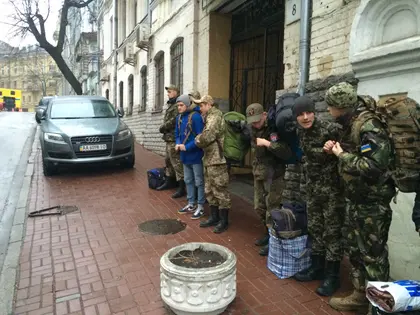These young men have signed up for the DUK Battalion, or Ukrainian Volunteer Corps, a fighting force affiliated with the ultra-nationalist Right Sector (Pravy Sektor) group.
As they line up in front of the building, their group leader is shouting at them to hurry up. They are waiting for their bus that will escort them to a training camp some 50 miles outside of Kyiv. There, they will be trained to go to war.
JOIN US ON TELEGRAM
Follow our coverage of the war on the @Kyivpost_official.
Among these men is 16-year-old Andriy, who does not want to give his last name because some members of his family don’t know about his plans to fight as a volunteer in eastern Ukraine.
“I’m not scared, but I know some relatives might be. Only my father and brother know about it,” he explains with weary eyes. He hasn’t slept for two days. The Sumy native traveled all the way to Kyiv with little money. He looks more like a boy scout than a volunteer soldier.
Some of the cadets make fun of him. “He’s the youngest, so he’ll be the one to make fun of,” laughs Maksim, a former biology student from Dnipropetrovsk who also doesn’t want to give his full name because some of his family lives in the contested Donetsk Oblast, although not in separatist-controlled terriroty. “I owe them to fight for my country,” Maksim proudly says.
At last the group of around 20 men have lined up, and start marching towards Mikhailsky Square where their bus is waiting for them to drive them to the training camp.
Group leader Ivan Bancharuk leads in front, as he shouts, “Glory to Ukraine!”
The young men then shout: “Heroes never die!”
Some local people passing by stop and pay their tribute to the men. A big, tall man shakes the hand of Ivan. “May God bless,” he says, and he gives some money.
Pravy Sektor does not get financial aid from the Ukrainian government. Their money only comes from volunteers and people sympathizing with the politics of the ultra-nationalistic group.
As the group arrives on St. Michael’s Square, a moment of silence is held for the soldiers killed during the war in eastern Ukraine. The young men, others as young as 16, stare at the ground, thinking. Some pray, others just close their eyes as some snowflakes cover their faces.
Then, after a moment of silence is finished, group leader Ivan claps in his hands, then raising his hand in the air, shouting: “Don’t be prepared to die! Heroes never die!”
An old woman passes by who introduces herself as Irina Goncharova. She brings some candy to the men, who she refers to as boys. “Look at them. They’re just boys,” she says.
Group leader Ivan kindly accepts the candy, but refuses to comment on Irina’s worries.
Fortunately for him, the bus arrives, and the men hurry to get inside where it is warm. ‘We’ll be back as heroes. We will fight until the end. Heroes will never die!’ Ivan says, as he and the cadets step in, and the bus departs to their training camp, preparing to take these men in their teens to war.
Stefan Huijboom is a freelance journalist living in Kyiv.
You can also highlight the text and press Ctrl + Enter




